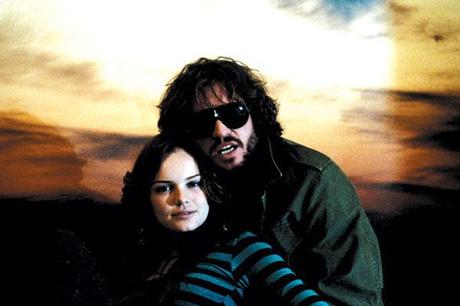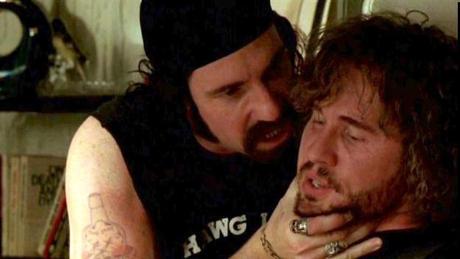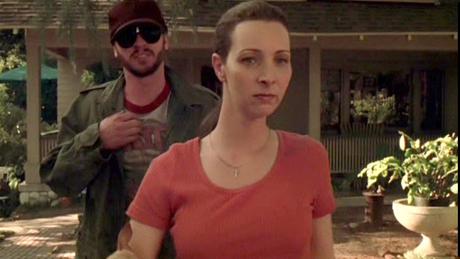37 years ago this week, four people were bludgeoned to death in a Los Angeles split-level along Wonderland Avenue. It was the bloodiest crime any member of the LAPD had seen since the Manson family murders, bloodier, even. The ensuing investigation resulted in murder charges being brought against the world's most famous porn star and one of LA's most notorious drug kings. Both were acquitted. One died forever denying any direct involvement in the murders; the other eventually struck a plea deal and lived well into his 80s before dying as a free man.
At the dawn of the new century, the above case inspired two wildly different movies: Boogie Nights (1997) and Wonderland (2003). T he former is Paul Thomas Anderson laying his best Scorsese impression over a fictionalized history of the Golden Age of Porn, using John Holmes stand-in Dirk Diggler as the throughline. When donkey dick Diggler hits rock bottom of cocaine addiction and finds himself in the wrong place at the wrong time, this is what happens:
To be clear, that infamous scene has little to do with the actual details of the Wonderland case. Alfred Molina and his bodyguard are based on real people, as is Wahlberg, obviously, and there really was a fight over the mysterious contents of a coked-out foreigner's safe. The actual Wonderland, however, was less a drug deal gone bad and more about one drug-dealing gang robbing the wrong dude (Eddie Nash, the inspiration for Molina's character) and later suffering mortal consequences via lead pipes to the head. However, Anderson's fictionalized version perfectly captures the essence of 80s drug culture and the moral despair of someone reaching the end result of making far too many bad decisions. How, honestly, do you ever top that?
The answer is you don't.
Wonderland director James Cox knew as much, telling Willamette Week: "I'm such a tremendous fan of Boogie Nights that I really didn't have any interest in treading on common ground."
So, Wonderland, which Cox also co-wrote, takes a completely different approach, mixing a true crime procedural with a Rashomon gimmick. The specifics of the case are spelled out for us through contrasting police interviews with Holmes (played by Val Kilmer) and David Lind (Dylan McDermott), a member of the gang who was fortunate to not be at the house when the attackers came. Moreover, whereas Boogie Nights tells of the rise and fall and ultimate come back of its fictionalized Holmes Wonderland is exclusively concerned with chronicling the man's lowest moment.
As Cox put it, "The bottom of the well is really what my movie is-it's the terminal point for the night [Holmes] sold his soul for good and was damned."

We open on Dawn Schiller (Kate Bosworth), Holmes' teenage girlfriend who has just been thrown out of her dingy motel and has nowhere to go. A kindhearted Catholic (Carrie Fisher...no, seriously, Carrie Fisher in a nothing role) takes her in and preaches to her about turning her life around. Once Holmes finds them, though, he quickly squirrels Dawn away to a bathroom to do coke together and maybe have a quick fuck. They are, of course, quickly thrown out, freed to traverse the Los Angeles hills for drugs.
This is the portion of the movie which is more or less told from Dawn's point of view, and it's a grand introduction to the life of 80s L.A. coke fiends. Kilmer, as Roger Ebert perfectly summarized, is instantly convincing as Holmes, "We see him charming, ugly, self-pitying, paranoid, and above all in need of a fix. Drugs have replaced sex as his obsession and occupation, and Kilmer does a good job of showing how an addict is always really thinking about only one thing."
John finds her a different motel to stay at and leaves her there alone for days, eventually returning one early morning to crawl into bed next to her with a shell-shocked look on his face. Later that morning, the cops bust the door down shortly after Dawn sees a news report about some murders on Wonderland Avenue. She has no idea what's going on and John isn't talking, not to her or to the cops.

Then David Lind comes into play to tell his side of the story. But, wait, John's version of events is totally different, and he's willing to talk to the old Vice Squad cop he used to work with as a Police Informant. Hold on, though, because John actually has a wife (!), Sharon (a wonderfully restrained Lisa Kudrow), and she has her own version of the events, like how John showed up at her house bloodied and muttering incoherently after the murders. (Incidentally, of those three, only David ended up testifying in court.)
And so on and so on and so on.
Wonderland keeps doing this Rashomon thing because in all actuality there is only one confirmed surviving eyewitness to the murders and to this day she still has no memory of what actually happened. She only survived because the lead pipe which was dropped down on her skull didn't quite finish the job. There was a bloody handprint at the scene later linked to John, but he maintained that while he was forced to watch the murders he didn't actually harm anyone. A jury agreed with him, even though he didn't testify, and he died of AIDS complications 6 years later.
So, Wonderland makes due with presenting each person's version of events before finally reaching its own conclusion, waiting until the end to actually depict the murders themselves (along with smash cuts to the actual crime scene photos) and pretty definitively argue who did what.
It's a powerful ending, but there's a bigger problem: Cox doesn't seem to actually want to be making a movie about the Wonderland murders. Instead, he wants to make a movie about John Holmes, but Paul Thomas Anderson beat him to it. So, Wonderland has to twist itself into a Rashomon structure which wastes time taking a coke fiend and world-class liar like Holmes at his word before finally concluding in its final moment that, guess what, he was probably lying.
A casualty of Cox's narrative compromise is that none of the characters other than John, Dawn, and Sharon seem to matter. It's all just one big puzzle board where all the pieces are coked-out nothings, and silly little things like background, motives, and relationships need not apply. It makes Wonderland the type of film which sends you looking online for more information about the case because you're still so confused over everything, like, hold on, where did John's wife come from?

Cox, making his feature-length debut and using all sorts of camera, editing, and soundtrack tricks, is not unlike Anderson with Boogie Nights in his clear desire to announce himself to the world as new, important filmmaker. However, he's at his best when he just sits back and lets Val Kilmer and Lisa Kudrow act the hell out of a truly gripping scene like John and Sharon's long-delayed argument over why they're even still married and whether she still loves him. In moments like that, Wonderland truly does shine as a darker cousin to Boogie Nights. There aren't a whole lot of moments like that, though.
THE BOTTOM LINEA flawed mixture of true crime procedural and Rashomon as applied to one of Hollywood's most notorious murder cases, Wonderland shines in its few standout moments as a worthwhile companion to Boogie Nights but mostly comes off as a lesser Hollywoodland.
RANDOM PARTING THOUGHTS- Recommended further reading/listening for anyone interested in the real Wonderland case: John Gilmore's L.A. Despair: A Landscape of Crimes & Misdeeds, the Wonderland portion of Legs McQueen's oral history book The Other Hollywood or the recent podcast series The Wonderland Murders by Hollywood & Crime.
- Factoids left out of the movie: Liberace's lover proved to be a key witness in the case; John didn't call Eddie after robbing him, like an idiot, but was instead picked up off the street by his thugs; after the cops decided against putting John into witness protection the first thing he did once they set him free was to go straight to Eddie's house and not only beg for his life but also ask for a thousand dollars. Eddie gave him five hundred instead. It remains unclear to this day why exactly Eddie didn't just kill him.
- There is a Paris Hilton cameo as John Holmes arm candy.
- Christina Applegate and Janeane Garofalo are both in this, playing nothing parts. You'd be forgiven for not noticing.

